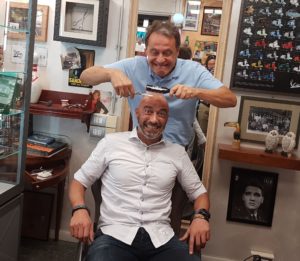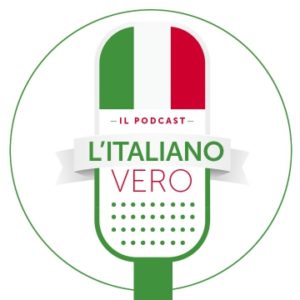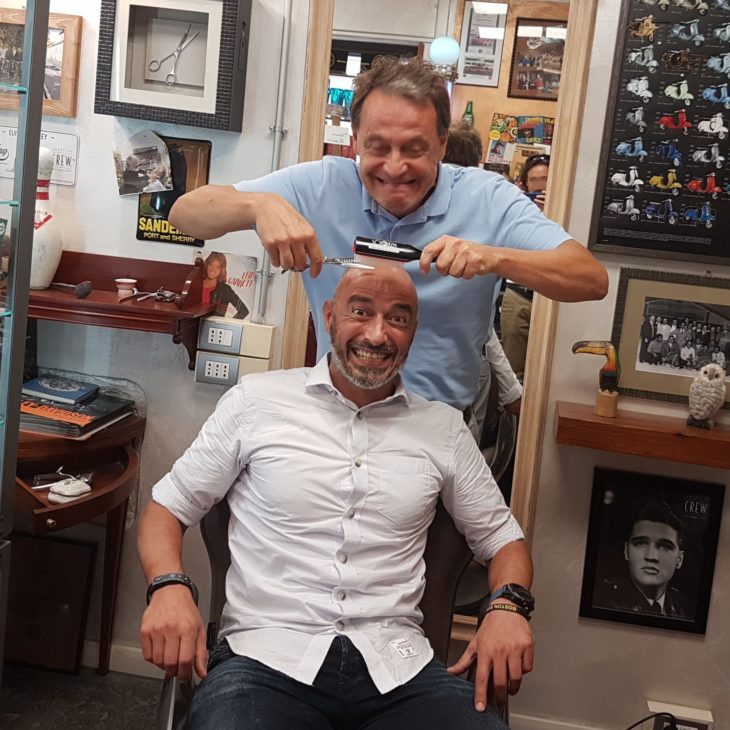
Blog in italiano
Tempo di lettura: 3 min
Tempo nel parlato: 5 min
________________
In questo episodio, i padroni di casa Cubo e Paolo, sono di nuovo in compagnia di Tomas, questa volta nelle vesti del suo secondo lavoro il parrucchiere. Tomas, infatti, come anticipato nel precedente episodio, al mattino lavora al bar che gestisce insieme alla sua compagna, mentre nel pomeriggio si sposta nel suo salone di parrucchiere.
Paolo fa subito una domanda trabocchetto (ndr. Aggettivo per indicare una domanda posta in modo da cogliere qualcuno in fallo o da fargli rivelare ciò che non avrebbe voluto o metterlo in difficoltà anche in maniera ironica) a Massimo , essendo lui praticamente pelato, chiedendo se va dal parrucchiere. Massimo risponde che in realtà ci va, ma non per tagliare i capelli (lo fa a casa con il rasoio elettrico), ma per salutare il suo amico Tomas e per fare del chiacchiericcio, meglio noto in Italia come pettegolezzo. “Infatti se in italia c’è un posto dove abitualmente si “spettegola”, quasi sempre bonariamente per fortuna, quello è il negozio del parrucchiere”
Il termine chiacchiericcio e’ venuto alla ribalta ultimamente in quanto il Papa in una sua udienza ha invitato i parrucchieri a svolgere la loro professione «con stile cristiano e trattando i clienti con gentilezza e cortesia», i parrucchieri devono vivere la loro attività come occasione per «una parola buona e di incoraggiamento»
I tre proseguono chiarendo la differenza tra barbiere e parrucchiere. Tomas ci spiega che colui taglia i capelli in passato veniva chiamato con il termine barbiere [der. di barba] in quanto era consuetudine recarvisi solitamente il sabato mattina anche per farsi radere la barba. Ma con l’avvento delle lamette usa e getta molto performanti dagli anni 90 al dopo 2000 l’usanza di andare dal barbiere è venuta un po’ meno, venendo anche meno l’utilizzo di tale parola a favore di parrucchiere. Col ritorno in voga della barba però ora si è tornati a ricorrere a questo mestiere pertanto anche il termine barbiere è ritornato ad essere molto usato.
L’episodio prosegue con Massimo e Paolo che si mettono nei panni di uno straniero, spiegando le parole che dovrebbe conoscere per richiedere un taglio di capelli termini da Italiano Vero, termini appunto che non si trovano in una comune grammatica italiana.
Vengono così alla luce dei termini molto belli come:
- “Spuntatina, regolata, accorciatina”: per intendere un taglio di capelli molto leggero che lascia praticamente invariata l’acconciatura del cliente. In una scala da 0 a 10 (dove 0 si intende non tagliere e 10 rasare del tutto) un 2.
- “Bella spuntatina”: aggiungendo “bella” (in questo caso significa abbondante) si intende taglio più abbondante. In una scala da 0 a 10 un 5.
- “Bella accorciata” per richiedere un taglio di capelli abbondante, capelli corti. In una scala da 0 a 10 un 8.
- “Rasato”: (come Cubo) In una scala da 0 a 10, 10.
Tomas ci dice inoltre che “lo shampoo” (il lavaggio dei capelli) va richiesto esplicitamente altrimenti non viene fatto. Inoltre Tomas chiede anche se vuole che sia usato anche il balsamo qualora secondo lui il tipo di capelli del cliente lo necessiti.
I tre tornano allora a parlare del “chiacchiericcio” chiedendosi se questa sia una abitudine anche all’estero (ascoltatori fatecelo sapere!!). Massimo chiede a Tomas se nel suo negozio ci sono le riviste di gossip che abitualmente si trovano nei saloni. Tomas risponde che lui si differenzia dagli altri in quanto ha solamente riviste sportive (ndr. essendo appassionato di sport).
L’episodio si chiude con i saluti finali con l’augurio di avere Tomas ancora in studio per parlarci degli altri mestieri che e’ in grado di fare, come l’orologiaio.
Blog in italiano by Massimo
Blog in English
In this episode, Cubo and Paolo invite Tomas back to talk about his second job as a hairdresser. We met Tomas in the previous episode where he discussed his other job, working at a bar that he runs with his partner.
Paolo starts the conversation by asking una domanda trabocchetto (a trick question) to Massimo (note: the adjective trabocchetto, which is to indicate a question posed in order to catch someone in the wrong, to make him/her reveal what he/she would not have wanted, or to put them in a difficult situation, also in an ironic way). “Do you go to the hairdresser?” Paolo asks Massimo. Massimo is practically bald, but he replies that he does go to the hairdresser, but not to cut his hair, which he does at home, but rather to say hello to his friend Tomas and to chiacchiericcio (chatter), or in another way, pettegolezzo (gossip). “In fact,” Massimo says, “If in Italy there is one place where people go for spettegolare” (to gossip usually in a pleasant way), “it would be at the hairdressers.”
Chiacchiericcio, or chattering, has recently come up because the Pope recently said to an audience that hairdressers should carry out their profession «con stile cristiano e trattando i clienti con gentilezza e cortesia» (in Christian kindness and courtesy with customers). Hairdressers should live their profession as an activity to give «una parola buona e di incoraggiamento» (a good and encouraging word to others).
Tomas, Paolo, and Massimo continue their conversation, noting the differences between barbers and haidressers. Tomas explains that in the past, people used the term barbiere (barber), which is derived from the word di barba, or beard). In the past, it was customary to go to the barber on Saturday mornings to have a shave. But with the advent of the high-performance razor blades in the 1990s and 2000s, going to the barber happened less and less, and the profession’s name changed to parrucchiere (hairdresser). Since beards are becoming more popular, and more people are returning to the shops, ther term barbiere has again, become more widely used.
The epsidoe continues with Massimo and Paolo “mettono nei panni di uno straniero” (putting themselves in the shoes) of a stranger to request a haircut in the “Italiano Vero” (true Italian way).
Let’s learn some new words and expressions not found in grammar books. Thus, “all luce” (come to light) some very beautiful terms, such as:
- Spuntatina (regulated, shortened): this means to have such a light trimming as to leave the client’s hair practially unchanged. On a scale from 0 to 10 — where 0 means no cutting and 10 means completely shaved — this would be a 2.
- Bella spuntatina (beautiful, but here it means abundant): this means to have a more abundant cut. This would be about 5 on the scale.
- Bella accorciata (well-shortened and more abdunant). This would mean having a short haircut, about 8 on the scale.
- Rasato (shaved, like Massimo): This means to have all the hair shaved, and on the scale, 10.
Tomas tells us that if a client wants to have “il lavaggio dei capelli” (hairwashing), that they would ask for “lo shampoo.” This would have to be explicitly requested, or else it will not be done. In addition, if Tomas thinks the client needs “il balsamo” (conditioner), he will ask the client if he/she wants it.
Paolo, Tomas, and Massimo return talking about “chiacchiericcio” as they wonder if this is habit common even abroad (listeners, let us know!). Massimo asks Tomas if there are “le riviste di gossip” (gossip magazines) in the salon. Tomas says that he only has “le riviste sportive” (sports magazines)! He’s a sports fan.
The episode ends, and Paolo and Massimo invite Tomas to the studio for another episode to talk about another job of his: l’orologiaio (the watchmaker).
Blog in English by Lee Okan
►Sostienici al costo di un caffè
senza di voi non ci sarebbe il podcast:
https://www.patreon.com/bePatron?u=23484073
►Contattaci per idee su nuovi episodi
https://www.litalianovero.it/wp/contatti/
►Facebook
https://www.facebook.com/litalianoveropodcast/
►Instagram
https://www.instagram.com/litalianoveropodcast/
 Settembre 9, 2019
Settembre 9, 2019 24 min
24 min Luglio 29, 2019
Luglio 29, 2019 13 min
13 min Luglio 15, 2019
Luglio 15, 2019 24 min
24 min Luglio 1, 2019
Luglio 1, 2019 15 min
15 min Giugno 17, 2019
Giugno 17, 2019 21 min
21 min Maggio 30, 2019
Maggio 30, 2019 29 min
29 min Maggio 9, 2019
Maggio 9, 2019 21 min
21 min Aprile 30, 2019
Aprile 30, 2019 28 min
28 min Aprile 17, 2019
Aprile 17, 2019 15 min
15 min Aprile 10, 2019
Aprile 10, 2019 24 min
24 min Aprile 3, 2019
Aprile 3, 2019 24 min
24 min Gennaio 26, 2020
Gennaio 26, 2020 21 min
21 min Gennaio 12, 2020
Gennaio 12, 2020 20 min
20 min Dicembre 29, 2019
Dicembre 29, 2019 24 min
24 min Dicembre 15, 2019
Dicembre 15, 2019 21 min
21 min Dicembre 1, 2019
Dicembre 1, 2019 12 min
12 min Novembre 17, 2019
Novembre 17, 2019 min
min Novembre 3, 2019
Novembre 3, 2019 20 min
20 min Ottobre 20, 2019
Ottobre 20, 2019 14 min
14 min Ottobre 7, 2019
Ottobre 7, 2019 9 min
9 min Settembre 23, 2019
Settembre 23, 2019 33 min
33 min Gennaio 9, 2024
Gennaio 9, 2024 6 min
6 min Dicembre 2, 2022
Dicembre 2, 2022 31 min
31 min Ottobre 8, 2022
Ottobre 8, 2022 18 min
18 min Dicembre 25, 2021
Dicembre 25, 2021 1 min
1 min Settembre 18, 2021
Settembre 18, 2021 21 min
21 min Agosto 14, 2021
Agosto 14, 2021 17 min
17 min Maggio 4, 2020
Maggio 4, 2020 32 min
32 min Aprile 12, 2020
Aprile 12, 2020 41 min
41 min Agosto 26, 2019
Agosto 26, 2019 18 min
18 min Agosto 12, 2019
Agosto 12, 2019 11 min
11 min Giugno 5, 2019
Giugno 5, 2019 9 min
9 min







Leave a Comment